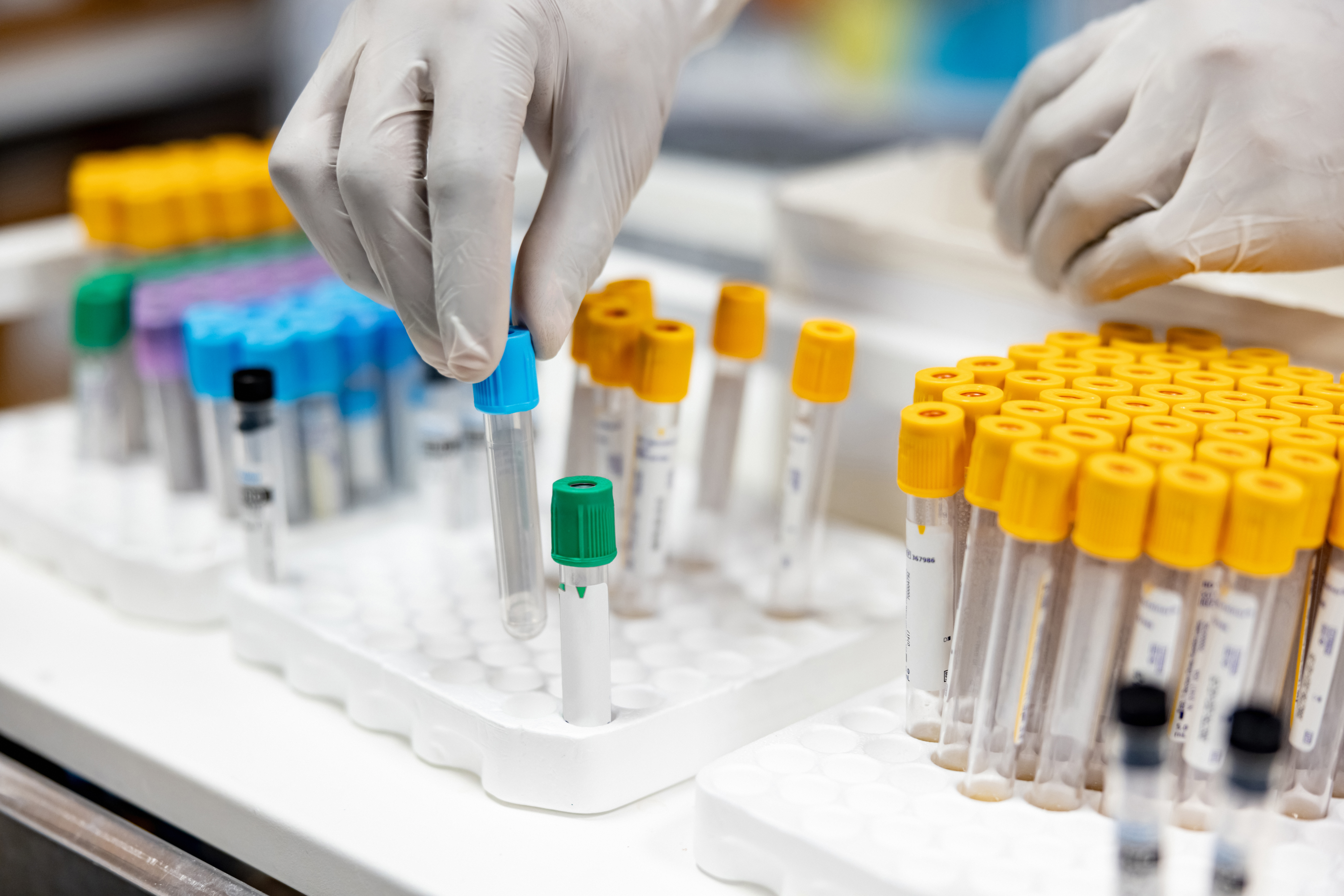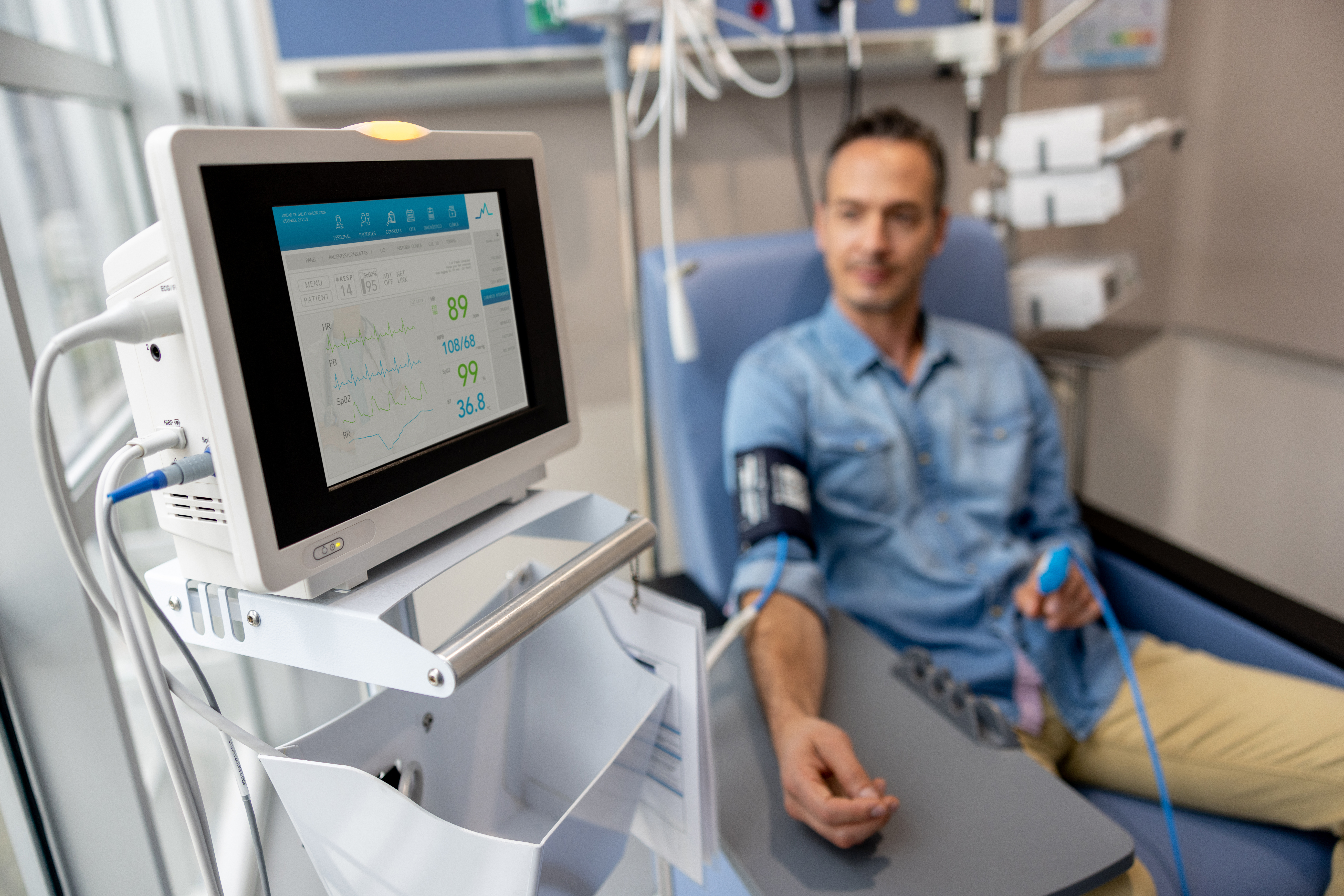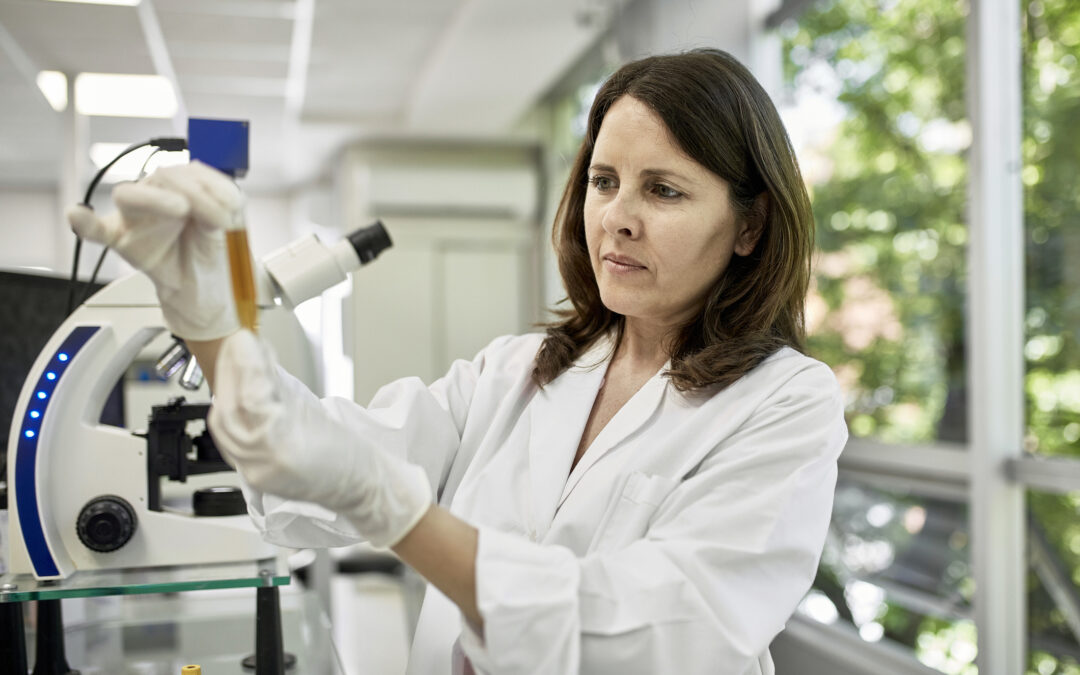
What Is Immunotherapy?
We understand how challenging a cancer diagnosis can be. That’s why we are committed to providing you with compassionate care and the latest advancements in cancer treatment. One promising approach that we offer is immunotherapy, a treatment that harnesses the power of your own immune system to combat cancer. This could involve enhancing your body’s natural defenses or developing new components to help your immune system target and destroy cancer cells.
As global leaders in cancer care and clinical research, we are proud to offer our patients access to the latest immunotherapy treatments. If you’re considering whether immunotherapy might be right for you, we are here to discuss your options and ensure you have all the information you need to make an informed decision. Your well-being is our top priority, and we are here to support you every step of the way.
Types of Immunotherapy
Groundbreaking therapies and innovative treatments
Resources
Information and guides about immunotherapy and other treatments
Immunotherapy FAQs
Get answers to commonly asked questions about immunotherapy
When is immunotherapy used as a treatment?
Immunotherapy can be very effective for certain types of cancer, including:

How immunotherapy works
Your body’s immune system is naturally equipped to protect you from allergens, viruses and other harmful diseases. When it detects a cancer cell, it usually tries to eliminate it. However, some tumors are known to be “cold” tumors where the immune system cannot identify that the tumor is another “foreign invader.”
Immunotherapy offers a hopeful solution by empowering your immune system, or infection-fighting cells, to fight cancer more effectively. This treatment can make cancer cells easier for your immune system to identify or help your body produce more cells specifically designed to combat cancer. We’re here to support you in exploring this promising option and to strengthen your body’s natural defenses against cancer.
Types of immunotherapy treatments

Stem cell transplants
Often referred to as a blood and marrow transplant, bone marrow transplant or hematopoietic cell transplant, this procedure plays a crucial role in restoring the stem cells in your bone marrow that have been affected by cancer. These stem cells are vital because they develop into blood cells, which are essential for your overall health and well-being.
Following chemotherapy, which targets and destroys the cancerous stem cells, you may undergo a stem cell transplant. The new stem cells will travel through your bloodstream to your bone marrow, where they begin to generate new blood and immune cells, helping your body heal. This healing process is known as engraftment.
There are two main kinds of stem cell transplants:
- In an autologous (AUTO) transplant, the stem cells come from you.
- In an allogeneic (ALLO) transplant, the cells come from someone else.

Chimeric antigen receptor (CAR) T-Cell Therapy
CAR T-Cell Therapy is a new cancer treatment designed to be particularly helpful for aggressive hematologic cancers that haven’t responded well to other treatment options. Our multidisciplinary experts are specially trained to oversee this therapy.
CAR T-Cell Therapy uses your body’s immune system to fight cancer cells. The process involves multiple steps that you will complete with the help of your care team over the course of several weeks.
Step 1: Your doctor will have you get a blood draw, after which, a machine will separate out the T-cells. The rest of the blood is returned to your body. This process is called apheresis.
Step 2: The T-cells go to a special lab, where they are injected with a disabled virus. The virus provides new genetic information to the T-cells—they don’t cause any harm. Afterward, the T-cells begin to produce new receptors called chimeric antigen receptors (CARs). CARs can find a specific protein only present in tumor cells. Once the CARs find a tumor cell, they destroy it.
Step 3: Millions of these cells are grown the lab, then sent back to your doctor to be returned to you over the course of two to four weeks.
Step 4: The new cells are returned to your blood, where they begin multiplying and fighting the cancer. You will probably stay in the hospital for several days or weeks afterward so your doctor can monitor your situation and address any side effects.

Monocolonal antibodies
Monoclonal antibodies are given through an IV, gently delivered into your veins. The number of treatments you’ll need will depend on the specific medication or combination of medications that’s best for you. These antibodies are produced in a lab and designed to help your immune system attack cancer cells.
Monocolonal antibodies can work in several ways:
- Flagging cancer cells to let the rest of your immune system know where they are
- Triggering cell membrane destruction to destroy the outer layer of a cancer cell, making it easier to kill
- Preventing blood vessel growth in order to keep a cancerous tumor from accessing its blood supply
- Blocking immune system inhibitors so your immune system cells can work more intensely against the cancer
- Attacking cancer cells directly
- Facilitating treatments such as radiation and chemotherapy, and making them more efficient
We’re here to provide personalized care and support, ensuring you feel informed and comfortable.

Checkpoint inhibitors
Some immunotherapies, known as “immune checkpoint inhibitors,” work by supporting your immune system rather than directly attacking the cancer. These medications take the “brakes” off your immune system to help your immune system recognize and target cancer cells more effectively.
Cancer cells can sometimes confuse your immune system, making it difficult to distinguish between normal cells and harmful invaders. Your body uses “checkpoint” proteins on immune cells to identify threats. Unfortunately, cancer cells can sometimes trick these checkpoints and evade detection. Checkpoint inhibitors help prevent this by ensuring your immune response remains strong and accurate, even in the presence of cancer.

Cytokines
Cytokines are small proteins that help control the growth and activity of other parts of your immune system. They can affect the growth of blood cells, which in turn can affect how your body deals with inflammation and cancer cells.
Some cytokines can be made synthetically in a lab and are used to help prevent or manage the side effects of treatments like chemotherapy. They can be injected under the skin, into a muscle or into a vein. The most common kinds are interleukins and interferons.

Stem cell transplants
Often referred to as a blood and marrow transplant, bone marrow transplant or hematopoietic cell transplant, this procedure plays a crucial role in restoring the stem cells in your bone marrow that have been affected by cancer. These stem cells are vital because they develop into blood cells, which are essential for your overall health and well-being.
Following chemotherapy, which targets and destroys the cancerous stem cells, you may undergo a stem cell transplant. The new stem cells will travel through your bloodstream to your bone marrow, where they begin to generate new blood and immune cells, helping your body heal. This healing process is known as engraftment.
There are two main kinds of stem cell transplants:
- In an autologous (AUTO) transplant, the stem cells come from you.
- In an allogeneic (ALLO) transplant, the cells come from someone else.

Chimeric antigen receptor (CAR) T-Cell Therapy
CAR T-Cell Therapy is a new cancer treatment designed to be particularly helpful for aggressive hematologic cancers that haven’t responded well to other treatment options. Our multidisciplinary experts are specially trained to oversee this therapy.
CAR T-Cell Therapy uses your body’s immune system to fight cancer cells. The process involves multiple steps that you will complete with the help of your care team over the course of several weeks.
Step 1: Your doctor will have you get a blood draw, after which, a machine will separate out the T-cells. The rest of the blood is returned to your body. This process is called apheresis.
Step 2: The T-cells go to a special lab, where they are injected with a disabled virus. The virus provides new genetic information to the T-cells—they don’t cause any harm. Afterward, the T-cells begin to produce new receptors called chimeric antigen receptors (CARs). CARs can find a specific protein only present in tumor cells. Once the CARs find a tumor cell, they destroy it.
Step 3: Millions of these cells are grown the lab, then sent back to your doctor to be returned to you over the course of two to four weeks.
Step 4: The new cells are returned to your blood, where they begin multiplying and fighting the cancer. You will probably stay in the hospital for several days or weeks afterward so your doctor can monitor your situation and address any side effects.

Monocolonal antibodies
Monoclonal antibodies are given through an IV, gently delivered into your veins. The number of treatments you’ll need will depend on the specific medication or combination of medications that’s best for you. These antibodies are produced in a lab and designed to help your immune system attack cancer cells.
Monocolonal antibodies can work in several ways:
- Flagging cancer cells to let the rest of your immune system know where they are
- Triggering cell membrane destruction to destroy the outer layer of a cancer cell, making it easier to kill
- Preventing blood vessel growth in order to keep a cancerous tumor from accessing its blood supply
- Blocking immune system inhibitors so your immune system cells can work more intensely against the cancer
- Attacking cancer cells directly
- Facilitating treatments such as radiation and chemotherapy, and making them more efficient
We’re here to provide personalized care and support, ensuring you feel informed and comfortable.

Checkpoint inhibitors
Some immunotherapies, known as “immune checkpoint inhibitors,” work by supporting your immune system rather than directly attacking the cancer. These medications take the “brakes” off your immune system to help your immune system recognize and target cancer cells more effectively.
Cancer cells can sometimes confuse your immune system, making it difficult to distinguish between normal cells and harmful invaders. Your body uses “checkpoint” proteins on immune cells to identify threats. Unfortunately, cancer cells can sometimes trick these checkpoints and evade detection. Checkpoint inhibitors help prevent this by ensuring your immune response remains strong and accurate, even in the presence of cancer.

Cytokines
Cytokines are small proteins that help control the growth and activity of other parts of your immune system. They can affect the growth of blood cells, which in turn can affect how your body deals with inflammation and cancer cells.
Some cytokines can be made synthetically in a lab and are used to help prevent or manage the side effects of treatments like chemotherapy. They can be injected under the skin, into a muscle or into a vein. The most common kinds are interleukins and interferons.
Integrative medicine
Integrative medicine unites conventional and alternative medicine techniques to improve a patient’s well-being during treatment. While you may receive treatments like chemotherapy or radiation therapy, with integrative medicine, you also get the support of complementary therapies like acupuncture, yoga, mindfulness-based cancer recovery (MBSR), meditation and energy medicine. Each integrative medicine treatment plan is personalized to match your most pressing symptoms as well as your personal preference.
Integrative medicine may help with other common side effects of cancer treatment, including:
- Dry mouth
- Fatigue
- Mood, depression and anxiety
- Nausea
- Pain
- Sleep problems
- Stress
Many patients who use integrative medicine for these side effects report a higher quality of life throughout their cancer treatment and into recovery. By incorporating these therapies into cancer care, we offer our patients a better overall experience throughout their cancer journey.
Immunotherapy FAQs
Our additional treatments
We’re here to help. Discover more resources on immunotherapy

How to Detect Skin Cancer
Skin cancer is the most common form of cancer in the United States with more people being diagnosed each year than all other cancers combined. Knowing what to look for can help catch it early when it’s much easier to treat.

Six Must-Knows about Bladder Cancer
Bladder cancer is the fourth most common cancer diagnosed in men, and men are four times more likely than women to develop it.

What is Metastatic Breast Cancer?
Metastatic breast cancer is breast cancer that has spread from the breast to other parts of the body. This is also referred to as advanced or stage 4 breast cancer.
We’re here when you need us
If you were recently diagnosed or would like a second opinion, request an appointment with one of our experienced cancer doctors right here in Nashville.
We’re here when you need us
If you were recently diagnosed or would like a second opinion, request an appointment with one of our experienced cancer doctors right here in Nashville.
We’re here when you need us
If you were recently diagnosed or would like a second opinion, request an appointment with one of our experienced cancer doctors right here in Nashville.

